Still looking for the perfect New Year’s resolution? It needs to be strong. Important. One that will: lead to everyday adventures; help you save money; give back to your community; clear up your skin; help you lose weight; improve your health; and save the planet!
What if I told you there was a resolution for all that?
Become a locavore!
Life-Changing Habits
Sometimes life changes come with the simple turn of the calendar’s page. Yet, it seems more common that life-changing decisions come on the heels of life-changing events that give us the push we really need.
Nineteen years ago, I resolved to stop eating meat. I had read that becoming a vegetarian was the number one thing a person could do to save the planet. I was just a kid: 16 years old. I didn’t have the willpower. Yet, I had gained weight as an exchange student living in Denmark. Thirty pounds! As my year started to wind down, the thought of returning for my senior year of high school with those extra pounds gave me the kick in the pants I needed. The decision had selfish roots, but I knew the outcome would help both me and the planet. I’m still vegetarian to this day.
My commitment to eating locavore has similar roots.
Feeding the World
In 2005, I landed my dream job at a nonprofit that was helping feed the world’s hungry. I got to travel the world, pen and camera in hand, documenting the stories of women’s lives changed through microfinance. Back at our California headquarters, I spent time building friendships with my co-workers, cooking meals together in the large office kitchen. These weren’t just people I showed up to work with—they were like family. Every day at the office was a joy. I built programs from scratch, had a boss supportive of my innumerable ideas, and spent an equal amount of time laughing as working.
All the while, my interest in food was building. I read Jane Goodall’s Harvest for Hope, a book that began to change my attitude towards organic food and genetically modified crops. Then I read Animal, Vegetable, Miracle and learned the importance of eating locally-grown foods. I couldn’t put these books down. My collection of nonfiction food literature was rapidly expanding. I wanted to commit to this way of eating. But it was hard. And I was busy.
Yet, I had a few things to feel good about. I started buying more organic foods. My husband and I moved into a new house, and we hired a guy to tear out an old, concrete dog run in the hopes of planting a vegetable garden. The future looked bright.
Losing It All
But just as quickly as spring blossoms burst onto trees, in 2008, a few months after moving into our new home, I lost my job. The economy had started to turn, and fewer people wanted to support international causes when there was a crisis taking place at home. The nonprofit I worked for cut nearly half its staff, and as fast as you could say, “recession,” my position disappeared.
I drove home that day, devastated. We had just taken on a mortgage that was a bit of a stretch for our budget, but we assumed it was a safe bet because no one’s salary ever goes backwards—only forwards—especially with both my husband and I working full-time in management-level positions and with Master’s degrees. How could this happen to me?
As I pulled into the driveway, I saw the piles of concrete that had been pulled up from the old dog run on our property. It looked like a bomb had dropped.
Soft, healthy dirt lay beneath the rubble: happy, life-giving dirt.
My husband and I sat down to go over our budget. There were plenty of costs we could cut immediately. We would skip installing a land line and use our cell phones, and I would strip the highlights out of my hair and go natural to save on expensive visits to the hair dresser.
What about the grocery bill? Weekly, there were stories in the newspaper about the rising cost of groceries. With my recent commitment to buying the more expensive organic foods, how could we make due?
Meeting Jane Goodall
With these questions swirling through my mind, I packed my bags. Although I had lost my job, the nonprofit had already paid for my attendance at a professional conference. They were kind enough to let me maintain my registration. They thought it might be a good networking opportunity for me.
Pushing back tears, and with a worried pit in my stomach, I boarded the plane. As I flipped through the conference catalog, my heart skipped a beat. I had registered long before they had announced their keynote speakers. Her face leapt from the page like a beam of light. Jane Goodall. Guest speaker!
On the day Ms. Goodall spoke, she offered a book signing. I had the rabbit-eared copy of her book that I held so near and dear. I clutched it close as I stood in the long, winding line. When my turn finally came, I told her how much her book had inspired me, and how I had recently started buying organic foods.
“Keep that up!” she said, sounding pleased. “It’s so important.”
How I Became a Locavore
Hence, with a nudge of inspiration from a hero, my life as a locavore began. Like our grandmothers during the Depression, I turned to my kitchen and my garden to get our family through. Before becoming a locavore, I could easily spend $150 to $200 in a weekly trip to the grocery store. Once I set my locavore lifestyle firmly in place, I cut my grocery expenses in half.
But you know what? I started seeing other benefits, too. Our garden was finally finished—five raised beds built by my husband—and I was spending more time outside, planting, weeding, watering, and finding calm. I started venturing beyond the boundaries of our yard to go for walks and jogs. I discovered wild blackberries, elderberries, and black walnuts growing in the wild—free for me to feed my family!
Losing Weight
I started losing weight. I dropped from a size 8 to a size 4.
Saving Money
For a mere $200 investment of seeds and starter plants, once my garden burst into season I no longer had to buy produce. From the first zucchini in June to the 20-lb watermelon in August to the final bell pepper in December, our summer garden gave us all the fruits and vegetables we needed.
Eating More Variety
Our meals were some of the best we’ve ever had. The standard go-to meals I used to prepare didn’t necessarily fit my new, seasonal lifestyle. I had to let my garden decide what was for dinner. If my garden gave me eggplants, I made curry or eggplant parmesan. If my garden gave me cucumbers, I made cucumber cake. If my garden gave me tomatoes, I made pasta sauce and froze extra for the winter ahead.
Clearer Skin
Variety defined our kitchen table. I improved my cooking skills. My skin started to look clearer. Despite being unemployed in a field that was rapidly cutting jobs as the economy worsened, I was actually pretty happy.
Bigger Adventures
That’s when I started this blog—at a time when food was nourishing me in ways I never thought imaginable. I created Awake at the Whisk to share those joys with others, in the hopes that my readers might find value in a locavore diet, too.
About six months after the saga began, I found a job. Yet, I didn’t give up my locavore lifestyle. I was earning far less than I had at my previous job. Times were still hard. I found that my everyday stresses subsided as soon as I stepped into my garden.
Join Me!
Join me on this journey! If you’ve been considering the benefits of eating locally, this New Year is a great time to start!
Farmers’ markets continue to grow. In California, we have incredible access to fresh, local food, and an endless growing season. If you live in this great state, there’s really no excuse not to try living local.
Yet, even if you live elsewhere, like in the middle of Illinois, farmers’ markets and farm to table restaurants are increasing in popularity. Chefs are brewing their own beers, butchering their own pigs, and sourcing more ingredients locally.
Come play! I promise this is fun! Here are a few pointers to get you started.
5 Tips to Live la Vida Locavore
1) Don’t go whole hog right away.
After reading books like Animal, Vegetable, Miracle, you may be tempted to jump feet first into a 100% local lifestyle like Barbara Kingsolver did. My recommendation: DON’T!
The quickest way to fail at anything is to beat yourself up about not dedicating yourself completely from the start. A marathon runner must begin by stretching. You’ll be most successful if you do the same.
What are the warm-up locavore activities that will make you most successful? Start by going to the farmers’ market once a week. Or, commit to buying only locally grown meats. Or, plant your garden. Pick one. You can add more later.
2) You don’t have to make your own cheese.
When I first became locavore, I thought I should make everything from scratch, grow everything myself, and be completely self-sustaining. WRONG!
I may want to own a beehive, but I’ve got access to plenty of locally grown honey right in town. I may want to know how to make my own cheese, but I don’t have time, and there are plenty of California-based cheeses I can buy painlessly. Not every locavore project needs to be DIY. It’s okay to get help from others. If you spend too much time on this, your boss and your family won’t be happy, and neither will you. Keep it simple.
3) Plan Ahead
Living la vida locavore takes advance planning. You can’t wake up in January and decide to plant a tomato garden. Do some research. Find out what grows best in your area. Use apps that help you locate local farmers’ markets and products in your town. This summer, I needed a food dehydrator. Rather than jump in my car and head to Target, I did some research online to find a local retailer selling dehydrators. Turns out, they are being manufactured right in my city, so I went straight to the source to make my purchase. It pays to plan ahead.
4) Make Your Own Rules
Living la vida locavore doesn’t come with a guidebook. Just like being a vegetarian (do you eat seafood? Eggs? Dairy?), there’s a lot of flexibility to this lifestyle, and you should create rules that work for you.
As I read more books written by locavores, each creates rules based on geography. A locavore in Michigan has to plan far ahead to can and preserve summer produce in order to enjoy it during winter when nothing fresh is available. In California, we can keep buying it straight off the supermarket shelves year-round.
Will you commit to eating only local produce even in winter? Or will you only be a summertime locavore?
Will you eat spices and coffee shipped from the Southern hemisphere? Or will you rely solely on fresh herbs you grow?
This is a personal journey. Make rules that you know you can follow.
5) Renew Your Library Card & Grow Community
You’re going to need to brush up on your home cooking skills, your gardening, your canning, and any other DIY project that your locavore lifestyle leads you towards. Eating local takes time and investment—it’s fun, but it’s essentially a new hobby.
Read up, become educated, and reach out to others who already know how to garden, have 103 recipes for how to use zucchini, and will let you borrow their dehydrator. Eating locally is all about supporting and building your community. Get out of the house and start making friends!
Oh—but come back and read my blog, too. I promise to keep the locavore tips and recipes coming!




 Follow
Follow
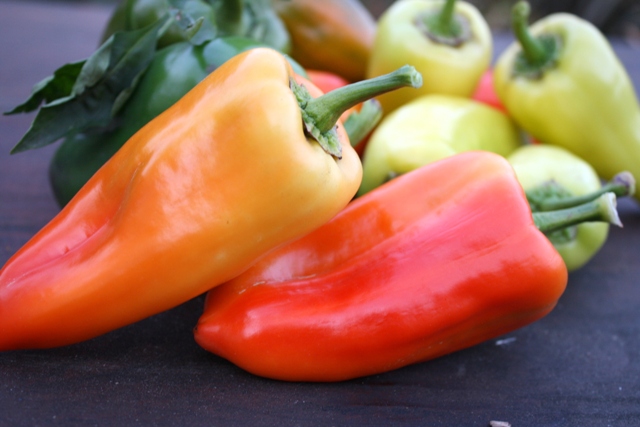
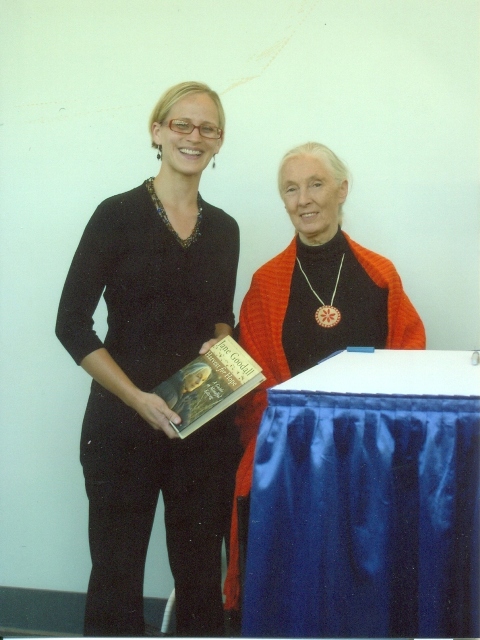
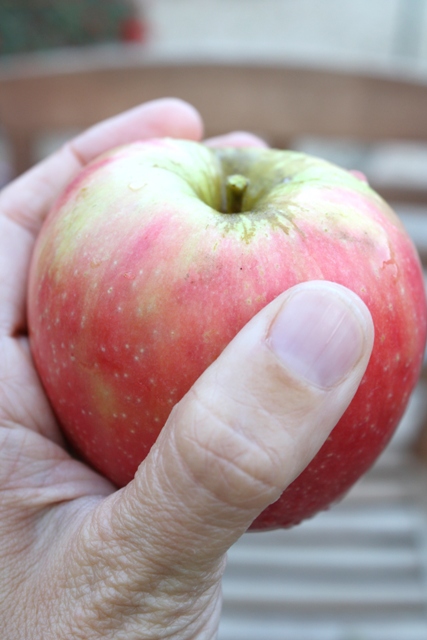
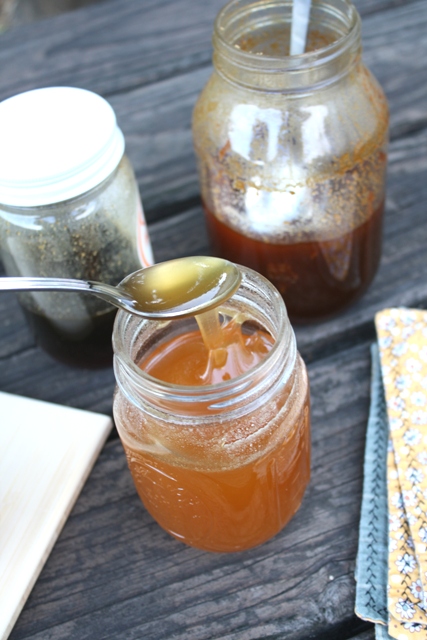
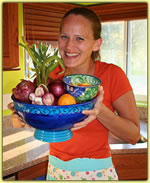
{ 31 comments… read them below or add one }
This post is just flat-out awesome–well-written and full of good info. Thanks for the continuing inspiration!
Wow! Thanks, Rowdy Chowgirl. That really made my day! 🙂 Thanks for your praise. I just love your writing, and I’m tickled pink to think you enjoyed reading this.
Oh, I will be following your blog from now on! I enjoyed this piece so thank you!
Yay! I’m so happy to hear it. Thanks, Lili. I look forward to seeing you here more.
thanks, from half the way around the world 🙂 after banging my head against the wall a few times, trying to raise those wonderful, exotic herbs and vegetables, i finally discovered the truth about not swimming against the current and, to my delight, there is an endless bounty to be enjoyed even in a garden with heavy clay soil and precious little water:) but now, i also learn there is something else to read and work on : locavore.
Aysen, I empathize with your challenge of bad soil. My current home has amazing soil, but my last house had only clay. I’m glad you’ve managed to grow some things to enjoy! Thanks for reading!
I needed this. I just left my dream job with a non profit and have embraced living with less money. We have always been earth conscious with our purchases, you know small cars, recycled products, organic if they have it sort of thing. We get our clothes second hand all that good stuff. I actually enjoy this and sometimes fantasize about living totally off the grid and being self sustained. Only fantasy tho 🙂 The one thing I have not been successful at is food. I have wanted to. I have good intentions. I have not ever been able to commit. I think I can now. Thanks for having this. It’s great help.
Jen, Wow! You’re inspiring me! I’m so happy to hear that you want to try eating local food. It’s such a joy-filled adventure. I look forward to talking more! Good luck!–and keep me posted as you go.
Very good info. Your advice is great and I’m looking forward to getting started! Thanks!
Pam, Hurray! I’m so happy to hear this. I look forward to hearing about your adventures, too. Thanks for joining me to live la vida locavore!
If I cmoumicnated I could thank you enough for this, I’d be lying.
Thank you, Karsen!
I’m so glad one of my friends had Shared this on Facebook (as I call it ‘ShareWorthy’… I’m a Seinfeld fan from way back and Elaine and the SpongeWorthy episode just resonated for Facebook ShareWorthyness). I’m an occupational therapist — which is what Jane Goodall’s education was originally in as well. I’ve read her book that you referenced, along with others which continue to inspire and add to my ‘fund of knowledge’. My website (Lumigrate) is about progressive health education, integrative medicine, functional medicine and I agree with The Rowdy Chowgirl, this is particularly interesting and well done. It comes from the heart AND is educational — a good combination. Kudos! ~~ Mardy
Mardy, I’m so thrilled you found this “shareworthy”! And thanks for letting us know about your site, too. I’ll check it out! How cool that you have the same background as Jane Goodall. 🙂
Jane Goodall is a huge hero of mine too! Have you read this?
http://www.ecorazzi.com/2011/12/12/jane-goodall-says-meat-symbolizes-fear-pain-and-death/
Michelle, interesting article! Thanks for sharing it.
This is inspiring. I live at 9000 feet elevation and it’s so tough to garden in a short season, but we try and every year is a little better than the one preceding it. There’s a ton of parallels between this article and my current situation making it easy to relate to. It’s good to hear someone who has been successful in this lifestyle, remind not to overwhelm ourselves but to enjoy the process. Thanks!
Klaw, I’m so happy to hear that you’re able to make a go of your garden even at 9000 feet. Very cool! Thanks so much for your warm words. I’m really glad you liked my piece.
Thank you! This is the most inspiring thing I have stumbled across in a really long time! An exciting read with realistic advice. I shared the link on Facebook begging all who are interested in health, the environment, saving money and supporting local business to read. I will also be adding this to my blogroll on emilyrevel.wordpress.com, if that is alright. In times like these, with the world in the state it is, these are the ideas we need to be streaming through our communities. Celebrating our capacity to self sustain and reinstating the fundamentals lost to convenience is where our mindset needs to shift. Thank you so much for helping to light the way.
Emily, Thanks so much for sharing the link to the story so widely! I look forward to reading your blog, too. It’s great to find a fellow reader committed to being “awake at the whisk.” Thank you for your enthusiasm! I look forward to seeing you around here. 🙂
What a pleasure to take in your encouraging mentoring wisdom in this wonderful piece. It only enhances the respect and love of your blog to receive this special “back story” to an interesting life. Thank you!
Pat, thanks so much for reading–and for your words. Look forward to seeing you back here again soon. Happy New Year!
It was great to read your blog. Like you, i felt inspired by Jane Goodall, although in a different way. As a wildlife biologist, for many many years, I gave up a life of commodities to live in the middle of nowhere with very basic stuff, but pursuing my passion: the study of animals. I have been lucky to live in very different places in this planet, from the desert and the mountains, to the great Amazon, and it has been witnessing the destruction of every single place where I go, and the thousands of homeless wild animals everyday as a consequence of this, that made me quit eating meat, getting organic and local whenever it’s possible, buying at a second hand store, and fighting hard mining, gas exploration, dams and other things that put in grave danger our precious, unique planet.
I recently moved to Cali and I’m discovering the wonders of growing my own food. It’s amazing. I lost my job at a very important NGO, and we have been through difficult times, but I am networking trying to get another one; although actually, losing my job wasn’t really losing. I certainly lost the chance to pursue my strongest passion at the moment, but at the same time, life gave me the chance to give life and best of all, the chance to live and grow everyday with my little boy. He’s my main assistant now when we plant, harvest, weed, etc. It’s certainly a pleasure to see him getting all filthy, but smiley when grabbing those cherry tomatoes that he likes so much and the strawberries that as soon as they get red, end up in his mouth.
I never eat out, I don’t have fancy clothes, we don’t even own a TV, but we are happy campers. Sometimes, though, it’s tough to live in a place where everything it’s different around you and it’s only in those times, when a little bit of loneliness hits. But then, lucky for me today, I found this blog and the comments. I feel lonely no more. Thx.
Helena, What touching words! Thank you for reading my story, and for sharing yours so openly. I’m sorry to hear about your job. It’s certainly difficult for many nonprofits right now. I’m glad to hear that you, too, have found some peace in your garden with your son. It always fills me with joy to find that a new seed has sprouted, or that a new tomato has ripened. I hope to hear from you here again!
JUST SAY BRAVO!!!!!!!!!!!!!! i am vegetarian from 35 years and when i read how the poor creatures arent killed…..for heat, for furs…..nooooooo, please GOOD, help us!!!!
Thank you for sending this thoughtful piece out into the world ~
You are a constant inspiration!
Aw, thanks, my friend! 🙂 Means a lot coming from someone as inspiring as you!
Great post! I needed something like this to inspire me.
Thanks so much, Rebecca. I’m so glad you liked the piece! 🙂
Im so proud to call you friend! I’ve extended my garden by 20 square feet! I’ve got quite a bit of room now, I’m so inspired by the thought of not buying produce! I hope you can take me foraging sometime for berries!
Jillena, you will save so much money from your garden! Much fun awaits you! As for foraging, there are no shortage of places in this city. We’re so lucky!
{ 1 trackback }